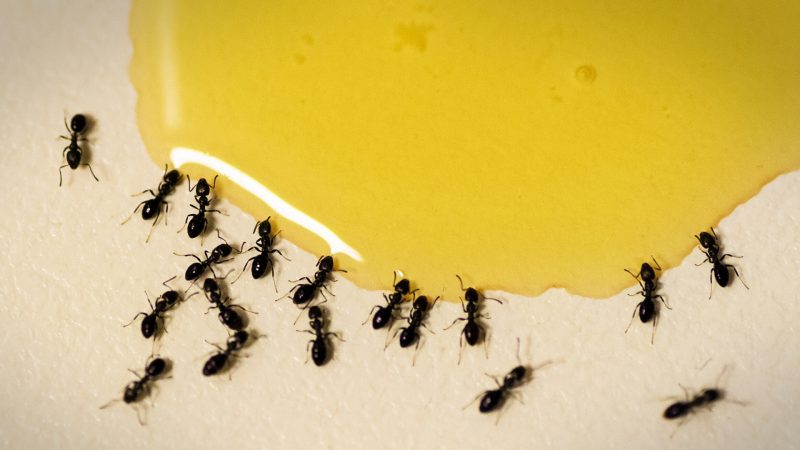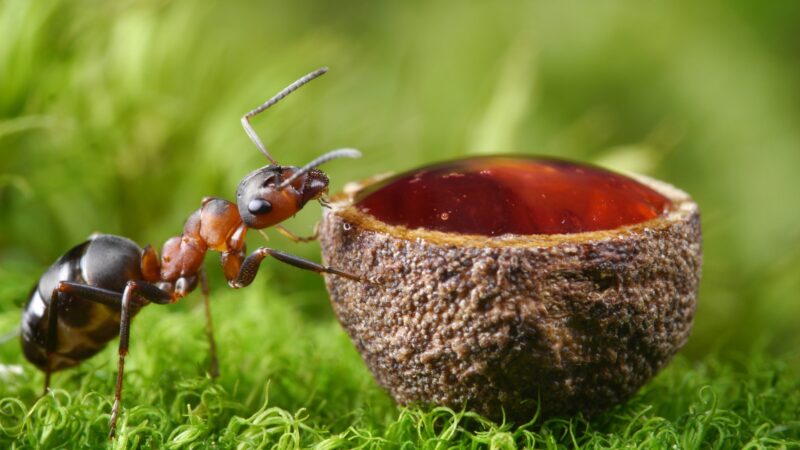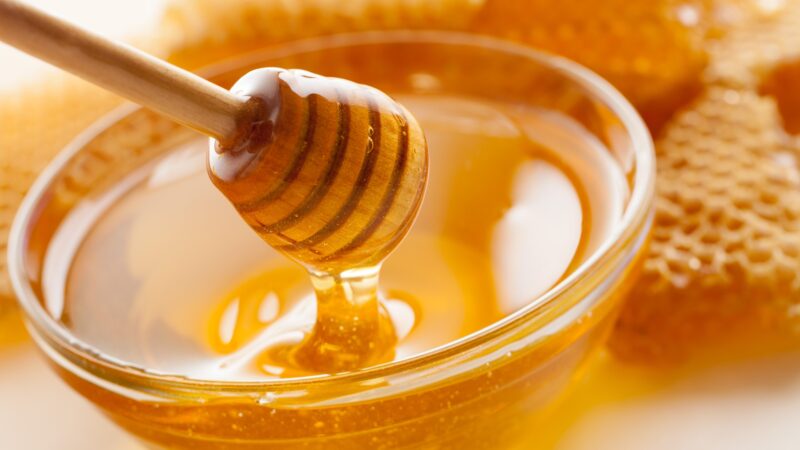Honey is an extremely sweet substance that can be found in most households. When dealing with certain pests such as ants sugary foods are usually one of the things they are attracted to. Now, we’ve all heard that ants love sugar, but what about honey?
Ants are attracted to honey because of its sugar content. The more diluted the honey the more it will be attractive to ants. To keep ants away from your honey, seal the container and keep it clean from the outside. You can even create ant traps using honey and borax.
Although ants are fascinating animals, no one wants to see them in their jar of honey or food in general. In this article, we’re going to explain how they find your honey, how to keep them out, and even some basic facts about ant food preferences. Let’s begin!
Why Does Honey Attract Ants?
Ants like sugary food for the same reason that we do, they are a source of energy that is easy to digest. Ants are opportunistic foragers and will eat anything that provides them with carbohydrates and protein.
Both honey and sugar contain glucose and fructose. Sugar has a 50-50 ratio of fructose and glucose. Around 70% of honey is glucose and fructose, and the other 30% is water, pollen, and minerals.

Many people think that if ants smell honey, they will head straight for it. However, researchers have discovered that ants find food by sending out individual scouter ants to search for food. These ants then randomly search for food.
If an ant finds some type of food it will then carry it back to the nest and leave pheromone trails behind. This way it will create a trail that will help guide the other ants back to the food source.
As the ants return to the food source, the scent trail becomes stronger until the ants eventually swarm your place. If you see a line of ants, you can be sure that they aren’t the first ones who have invaded your house.
How To Keep Ants Away from Honey?

If ants have gotten into your honey in the past, you will want to prevent that from happening again. Unfortunately, now that they know that you keep having honey in your house, they will seek it out. How can you keep it safe from them?
There are numerous and sometimes conflicting solutions. For example, you might run across someone who suggests that you put your honey into the refrigerator. However, according to Huff Post and others, honey should not be stored in a refrigerator.
One thing is for sure, honey does not go bad, and if stored in the fridge, it will only crystalize. Other people say it is fine to store it in the fridge as long as you either warm it up or are willing to eat crystallized honey.
Rather than putting your honey in the fridge, try some of the following methods:
- Obviously, you should wipe honey spills and clean the outside of your honey container before trying anything.
- Put cinnamon on a plate and place the honey on top. Ants will not walk across cinnamon.
- Keep the jar in a bowl of water. Ants are notoriously poor swimmers.
- Store the jar of honey in a Ziploc bag.
- Completely wrap the jar in foil.
If your house is infested with ants, keeping your honey and other food items safe will be the least of your problems. You need to get rid of them as soon as possible because the situation is going to become progressively worse.
The best solution is to use ant baits which take longer to act but have the best results. Ants will pick up the bait that contains poison and carry it back to the nest. Once the queen consumes the bait the whole colony will slowly die.
No products found.
Can You Use Honey for DIY Ant Bait?

There are numerous recipes for baiting ants with something sugary that also contains borax. Some of the combinations are sugar water and borax, a sugar and borax mixture, or honey and borax. Which one works best?
Well, that depends on what ants your certain ant species prefer. There are many types of ants in the United States and that is why every ant control begins with identification. Regardless, you can make an ant bait with honey in combination with borax but there are better options such as sugar water.
Why Ants Prefer Sugar Water over Honey?
One of the most surprising things about honey is how little water it holds even though it is liquid. When bees make honey, they use their wings to fan the honeycomb and speed up the evaporation process. Through this process, the water percentage in the honey falls from 70% to around 17%.
Bacteria or fungi need water content that is above 17% in order to multiply, which is one reason why honey doesn’t spoil. Another reason is the low water activity, which is the measure of how easy it is for the organism to access the water in a certain food.
Molds require a water activity of 0.75, and honey’s water activity is 0.6. Also, honey’s pH is around 4, which is something that most bacteria can’t handle.
Since ants’ water needs are connected to their food if given the choice between sugar water or honey, they prefer sugar water. They will have to work harder to absorb sugar from honey, and during that process, they won’t get much water.
Honey and borax will also work as bait for ants, however, since it is the borax that kills them, why would you waste expensive honey when sugar water works just as well?
If you want to see how long it takes ants to devour your honey, then check out this time-lapse video from the Ant Tastic channel.
Fun Fact: Some Types of Ants Prefer Tuna Over Honey
In a study that was conducted at the University of Georgia, Mark Brinkman, a research scientist, put out four baits to see which will ants like the most.
To test different food groups, he used honey, eggs, tuna, and peanut oil. Out of 5,000 fire ants, these were the results:
| Type of Food | Number of Ants |
| Tuna (protein and fat) | 4,594 |
| Honey (carbohydrate) | 355 |
| Egg (protein) | 294 |
| Peanut Oil (fat) | 50 |
Ants overwhelmingly preferred the protein and fat combo. It does suggest that if ants are given a choice between honey and food that combines protein and oil, they will choose the protein source.
For obvious reasons, using tuna to bait ants would not be a wise thing to do. What is important to note for this experiment is that there were 13 different types of ants including the fire ants. What is even more interesting is that the majority of the ants that were attracted to tuna were in fact fire ants.
The spilled honey in your house does attract ants. Keeping ants out of your honey starts with making sure that the container is closed and wiped clean.
Cinnamon is an excellent natural ant repellent. Creating a moat by placing your honey in a bowl of water also prevents them from getting into your honey jar. You can use honey and borax as ant bait, although sugar water and the borax will work as well, while also being cheaper.
Related: Do Dead Ants Attract More Ants? | The Play-Dead Phenomenon!
List of Sources
In Fire Ant Taste Test, Tuna’s Tops, University of Georgia
Nyamukondiwa, C., & Addison, P. (2014), Food preference and foraging activity of ants: recommendations for field applications of low-toxicity baits, Journal of insect science (Online)
How Ants Optimize Food Search, Science Daily
- How to Get Rid of Copperheads | Practical Guide - August 27, 2023
- How to Get Rid of Corn Snakes | What Makes Them Aggressive? - August 27, 2023
- How to Get Rid of Alligators | Safety Measures and Removal Methods - July 16, 2023

